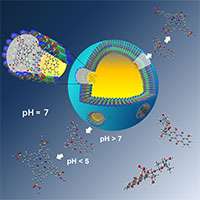Drug technology to improve health care

Researchers at RMIT University are developing new generation nano-sized drug delivery technology.
Dr Sheshanath Bhosale from RMIT's School of Applied Sciences is collaborating with scientists from the Indian Institute of Chemical Technology in Hyderabad on the multi-disciplinary research project.
Dr Bhosale and his team are analysing the effectiveness of the sustained release of a bioactive molecule from yoctowells - novel surface-engineered molecular cavities which allow the analysis of the separation, containment and manipulation of individual molecules.
"What is exciting is that the yoctowells system manipulates guest molecules, which means there is great potential to radically change the practice of therapy for a variety of diseases and disorders," he said.
"The yoctowells system therefore presents an excellent starting point for a new approach for encapsulation of drugs and sustained and controlled drug release and provides a platform for more sophisticated designs in the future."
Controlled drug delivery technology represents one of the frontier areas of science and the development of nano-sized drug delivery systems to transport drugs to diseased cells will enable highly targeted treatments to become available for conventional use.
This offers numerous advantages compared to conventional dosage forms, enhancing the drug release profile through absorption, distribution and elimination and improving product efficacy and safety, as well as patient convenience and compliance.
The research was published in the June edition of Scientific Reports, a primary research publication from the publishers of Nature, covering all areas of the natural sciences.
Professor Matthew Cuthbertson, Deputy Pro Vice-Chancellor Research and Innovation in the College of Science, Engineering and Health, said the publication was an example of RMIT's commitment to high-quality research of national and international significance.
"This study demonstrates that researchers at RMIT use theoretical and practical know-how to create innovative solutions to transform the future in the world of medicine," he said.
"In particular, this type of research represents a significant advance in the development of novel ways of administering protein and gene therapeutics to patients and contributes to advancements in the field of nano-biotechnology."
Journal information: Scientific Reports , Nature
Provided by RMIT University


















